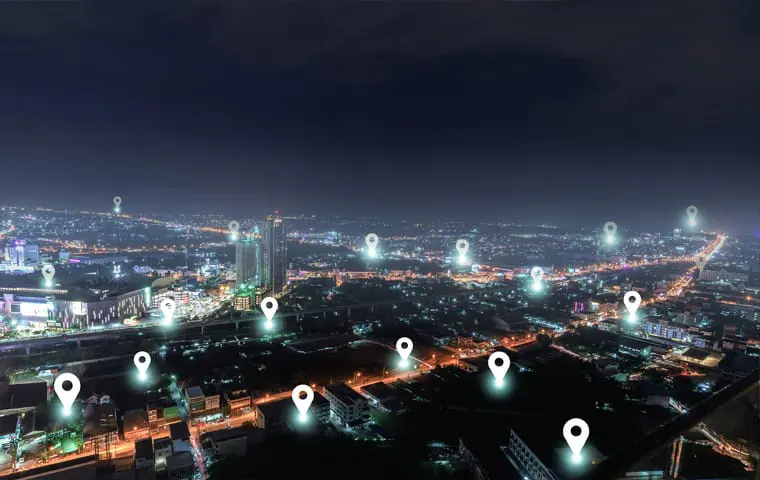
We’re all familiar with smartphones, and most of us even wear smartwatches, own smart thermostats, speakers, or doorbells. But what happens when smart technology takes over public spaces? A new trend doing just that in urban centers has recently started emerging called “smart cities.”
What Is a Smart City?
A smart city refers to any city that relies on smart technology to improve the lives of its citizens and visitors. Much like all of that other smart tech we’ve placed in our homes, a smart city relies on the Internet of Things (IoT) to collect data and then uses it to make things run more efficiently. Around the globe, smart city technology is becoming more common each day.
In London, technology helps to reduce traffic congestion by more efficiently controlling traffic lights. With data related to traffic patterns, cyclists, and other factors, a supercomputer can time traffic lights across the city for optimal traffic flow. Based on the traffic volume currently on the street, the computer can adjust each intersection with longer or shorter green lights.
New York City is offering a variety of services to residents and visitors through LinkNYC kiosks. Here you can check an online map to get directions to your destination, connect to free and fast Wi-Fi, make video calls, charge your smartphone, and even contact 9-1-1 if necessary. Large, 55-inch display screens on both sides of the kiosk show advertisements or broadcast public service announcements.
Dallas is partnering with tech companies like AT&T, Microsoft, and IBM to develop several initiatives. These include interactive digital kiosks like in New York, along with smart parking, smart irrigation, and other infrastructure. The hope is to provide a technological backdrop to solve problems resulting from increased population density alongside limited resources.
Chennai, India, is also rolling out several smart city technologies designed to improve life for residents. GPS-enabled bikes are available to the public to help decrease traffic and its resulting pollution. Smart classrooms are enhancing education across the city. And drones are being used to test pollution in bodies of water throughout the city. There are also solar energy initiatives, a smart disaster management program, and digital signage as well.
In North America, additional smart city initiatives are ongoing in San Francisco, Boston, Denver, Chicago, Kansas City, and several metropolitan areas. It seems inevitable that this technology will sooner or later spread to all major cities in developed countries.

How a Smart City Could Impact Your Fleet
With all of this technology possibly coming to a city near you soon, many may wonder how smart city technology might impact fleet management. There are many ways cities might implement this technology, and different cities have different plans for it. Below are some of the improvements that your fleet could see by implementing some of these technologies.
Connected Vehicle Technology
Connected vehicle technology, sometimes called V2X for vehicles to everything, is a large and growing field. A connected vehicle is any car, truck, or van that can communicate with external systems. These vehicles can notify drivers of road hazards, traffic slowdowns, and even bad weather. They can provide directions and inform others of the driver’s location and ETA. Fleets can use this type of technology to improve safety, optimize routing, and even offer top-notch customer service.
In smart cities, connected vehicles will likely be able to tap into more sources of data. They’ll also be able to make use of more powerful wireless communication services through smart city networks. This ability means the technology they possess will be even more powerful and beneficial.
Better Traffic Flow
Beyond the vehicles in your fleet, connected cities will help commercial drivers with better traffic flow overall. As in London, many cities are using smart technology to improve traffic flow through and around urban centers. Imagine the increase in commercial drivers’ productivity if traffic jams were lessened or became a thing of the past entirely.
Smart City Locating Services
Most drivers today use smart locating services regularly, or at least from time to time. Any time a driver searches for the nearest gas station or drive-thru, this technology comes into play. Now imagine the power of a smart city locating service, connected to an extensive network of data about the area’s businesses and services.
With a single command, drivers could find the nearest available parking spot to their destination. A driver could also learn the current price of fuel at each of nearby fuel stations and which are part of a specific fuel card network. They could then be routed to the appropriate fueling station, all with a single command. In the case of a maintenance need, smart locating services could search local garages’ inventory and availability to find the one with the needed part at the best price. The possibilities for this sort of service are endless.
The team at Azuga is ready to help your fleet step into the future. Learn how our fleet tracking software can go to work for your team. With our help, you’ll see a boost in productivity, improved driver safety and gain valuable insights on your drivers and vehicle diagnostics.








